Abstract
1. The whole-cell patch clamp technique was used to study the effects of acetylcholine (ACh) on Na(+)-K+ pump current (Ip) in acutely isolated guinea-pig ventricular myocytes. Studies were performed in the absence and presence of the beta-agonist isoprenaline (Iso). 2. ACh had no effect on Ip at low or high [Ca2+]i at any voltage in the absence of Iso. Iso alone inhibited Ip at low [Ca2+]i and shifted the Ip-V relationship at high [Ca2+]i in a negative direction. Addition of 1 microM ACh reversed these effects of Iso. K0.5 for the effects of ACh was about 16 nM, regardless of [Ca2+]i. 3. The actions of ACh on the heart are usually mediated via muscarinic receptors. Atropine, a muscarinic antagonist, blocked the effects of ACh on Ip in the presence of Iso, suggesting that these effects are also mediated by muscarinic receptors. 4. Muscarinic receptors are usually coupled to a Gi protein, leading to inhibition of adenylyl cyclase and a reduction of cAMP levels. We have shown previously that basal levels of cAMP are very low in guinea-pig ventricular myocytes, and that a membrane-permeant cAMP analogue, chlorophenylthio-cAMP (CPTcAMP), mimics the effects of Iso. ACh did not reverse the effects of CPTcAMP, supporting the hypothesis that the effects of ACh on Ip are also mediated via inhibition of adenylyl cyclase. 5. The present results suggest that a high level of parasympathetic tone alone does not affect the activity of ventricular Na(+)-K+ pumps. However, if sympathetic tone is high, then muscarinic stimulation can reciprocally modulate Na(+)-K+ pump activity.
Full text
PDF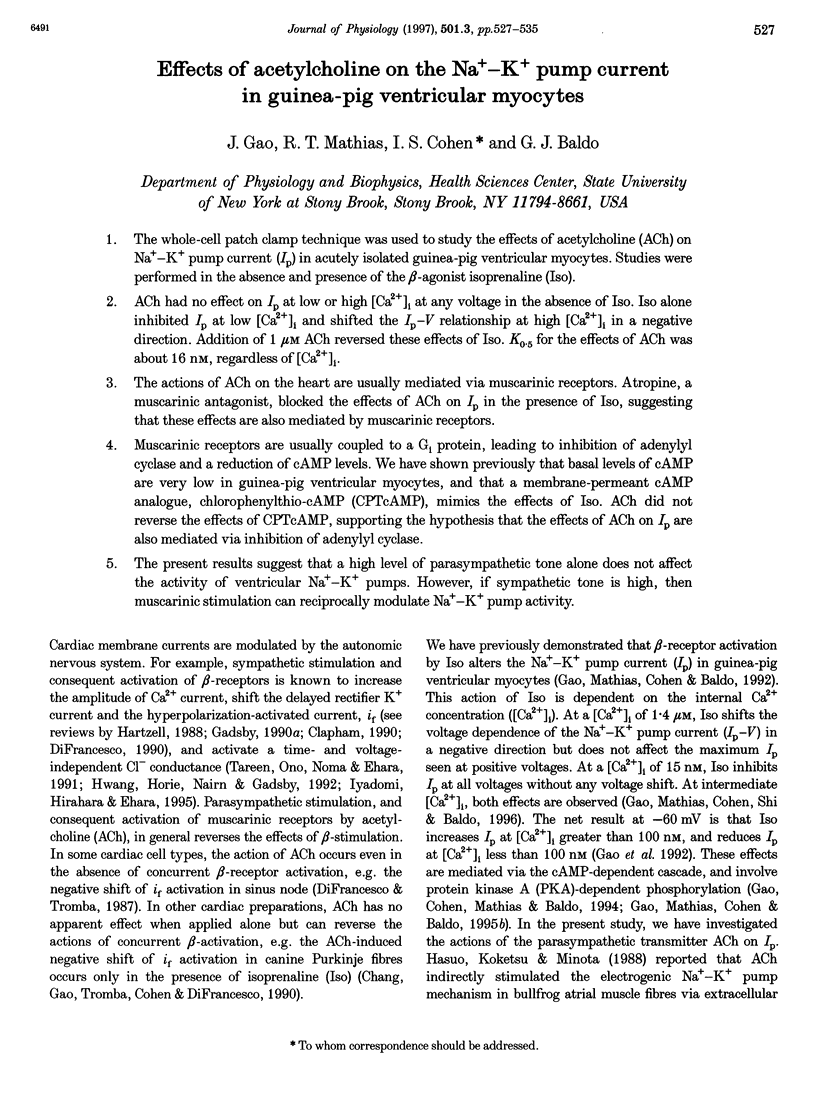
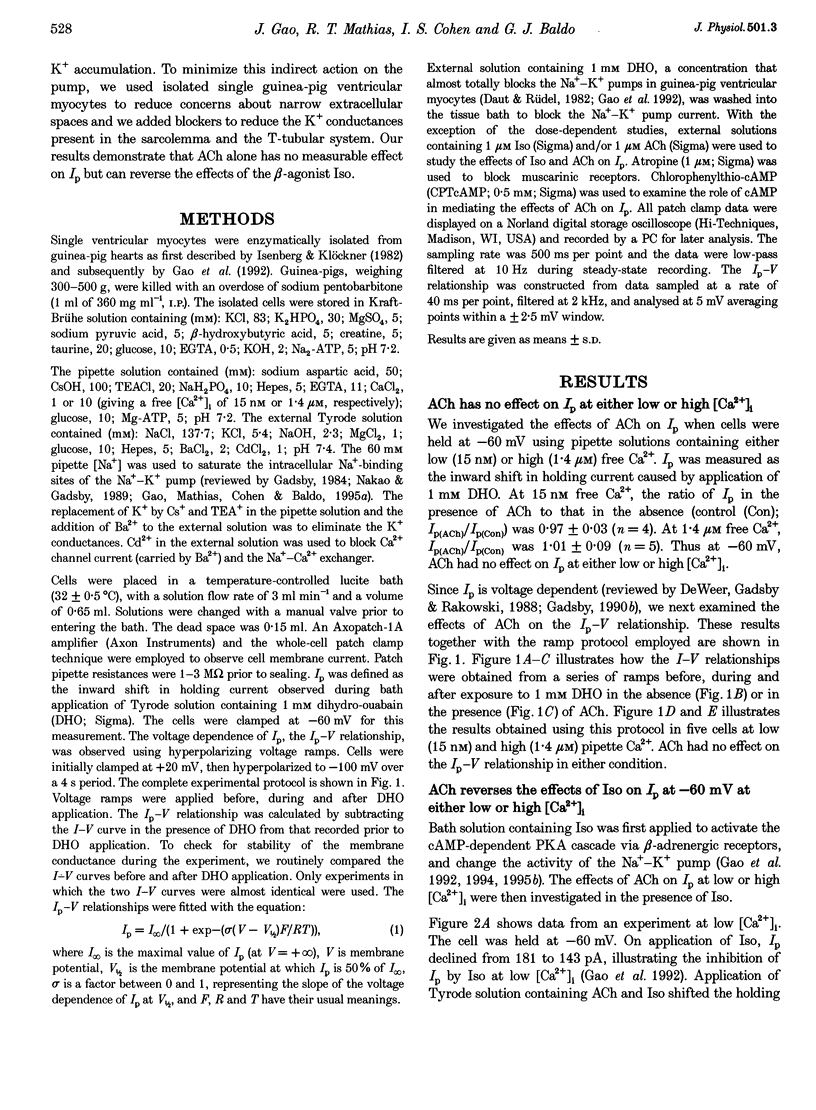
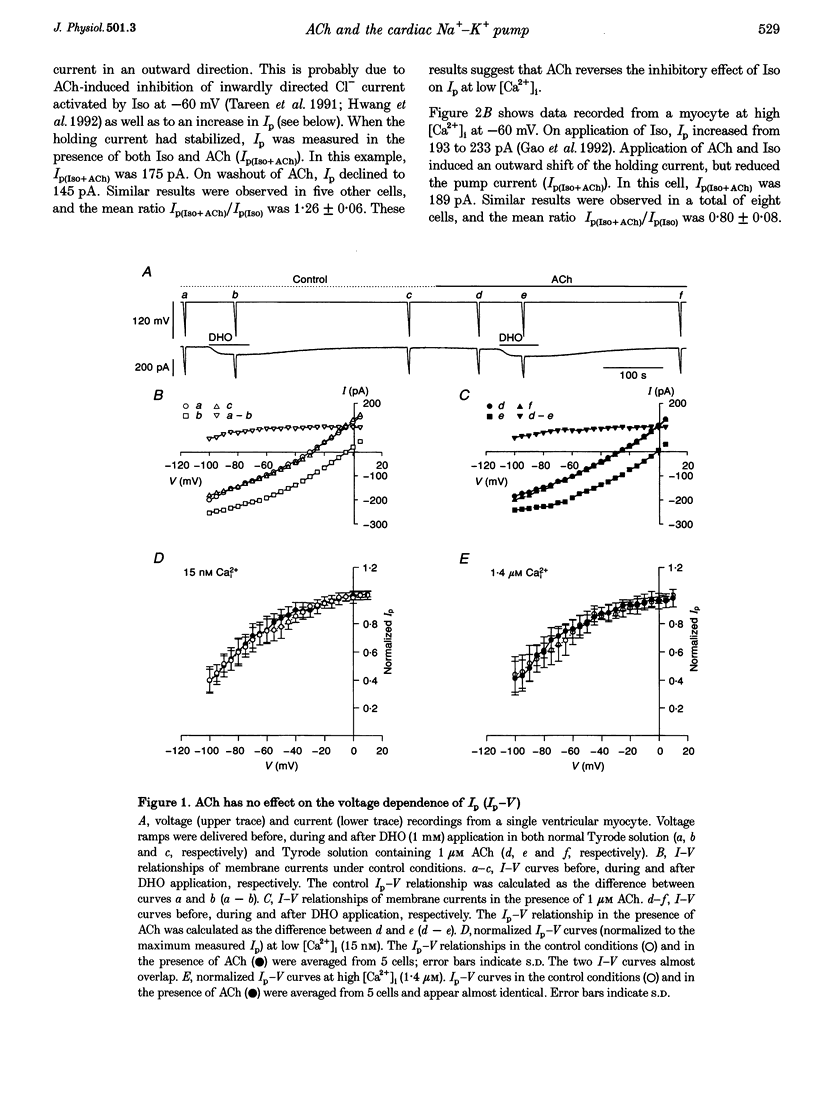
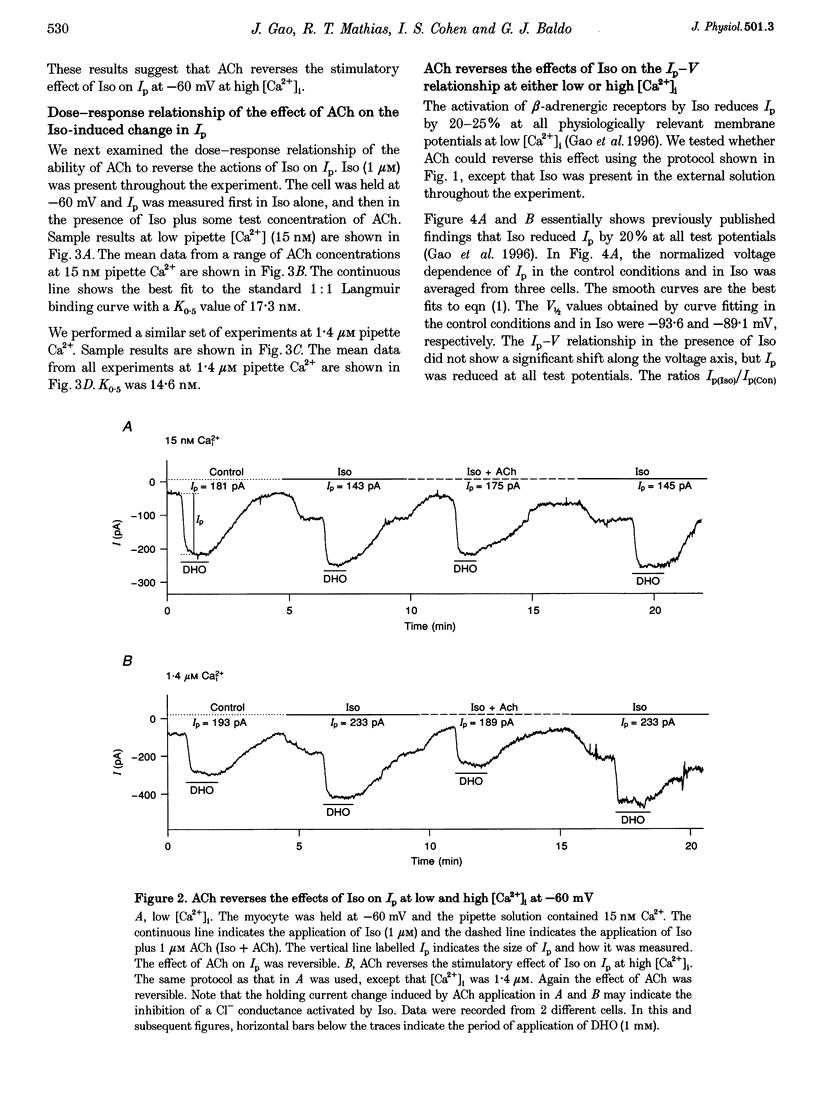
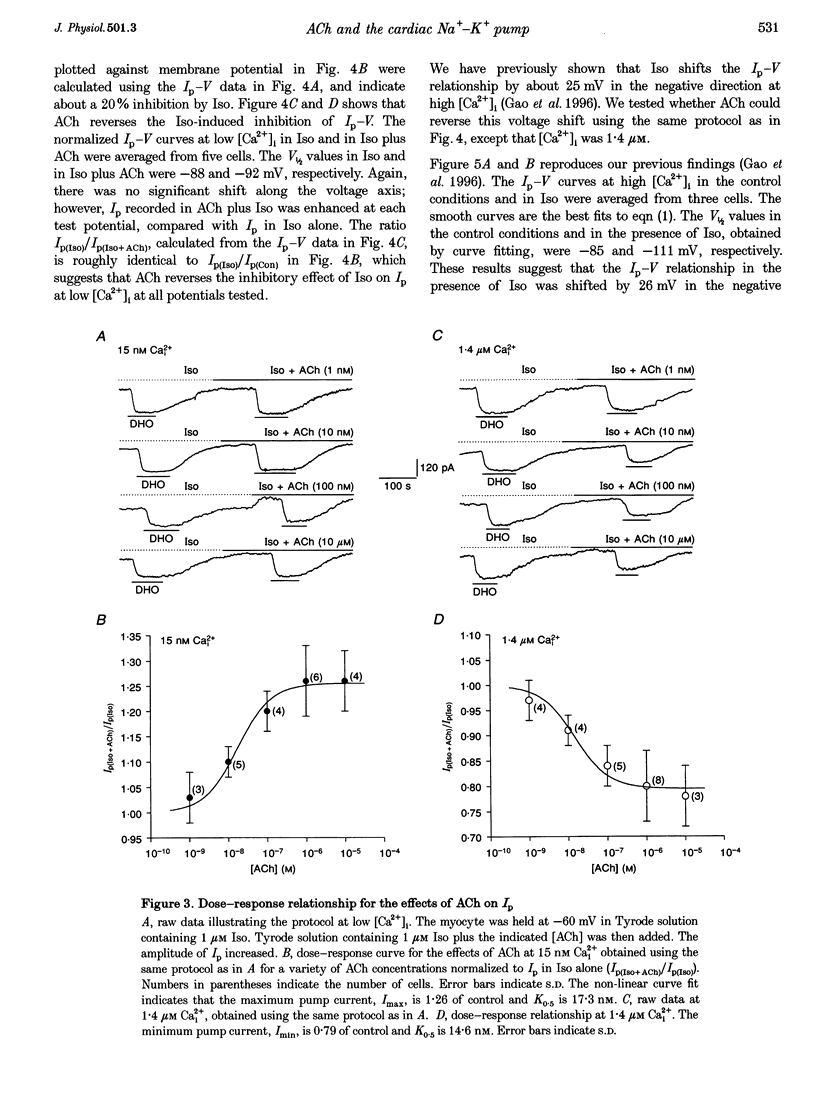
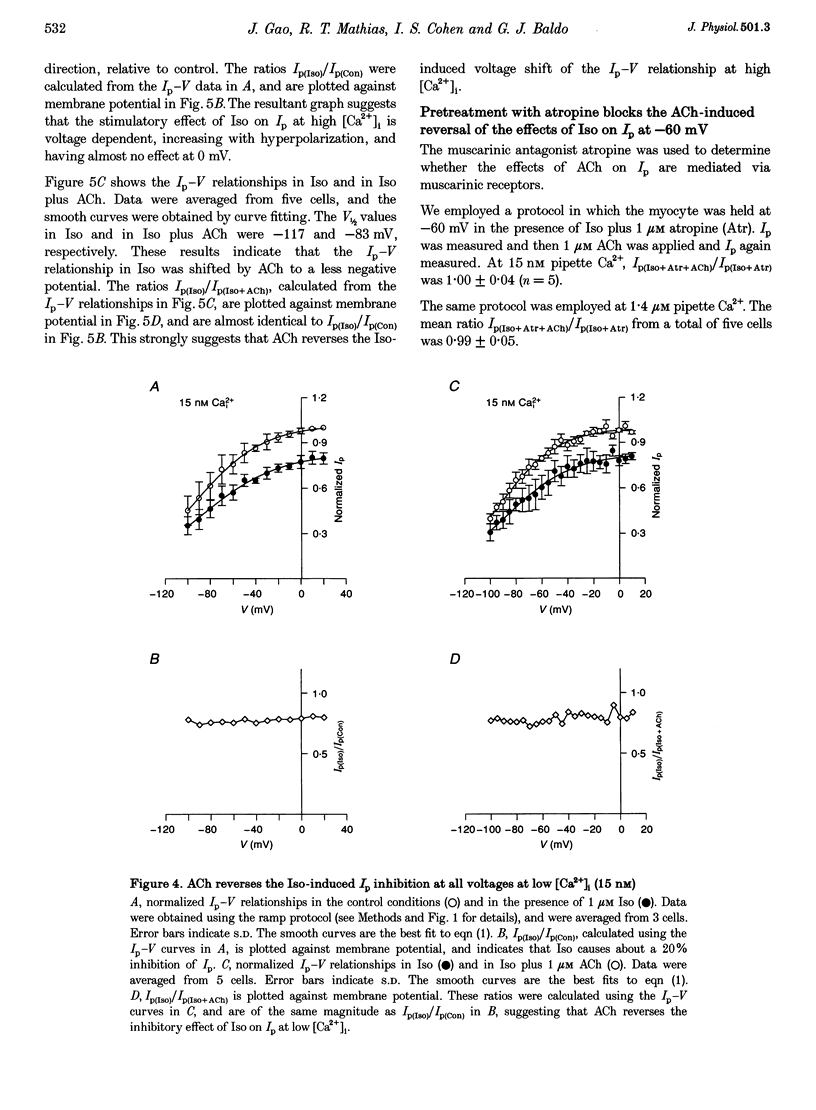
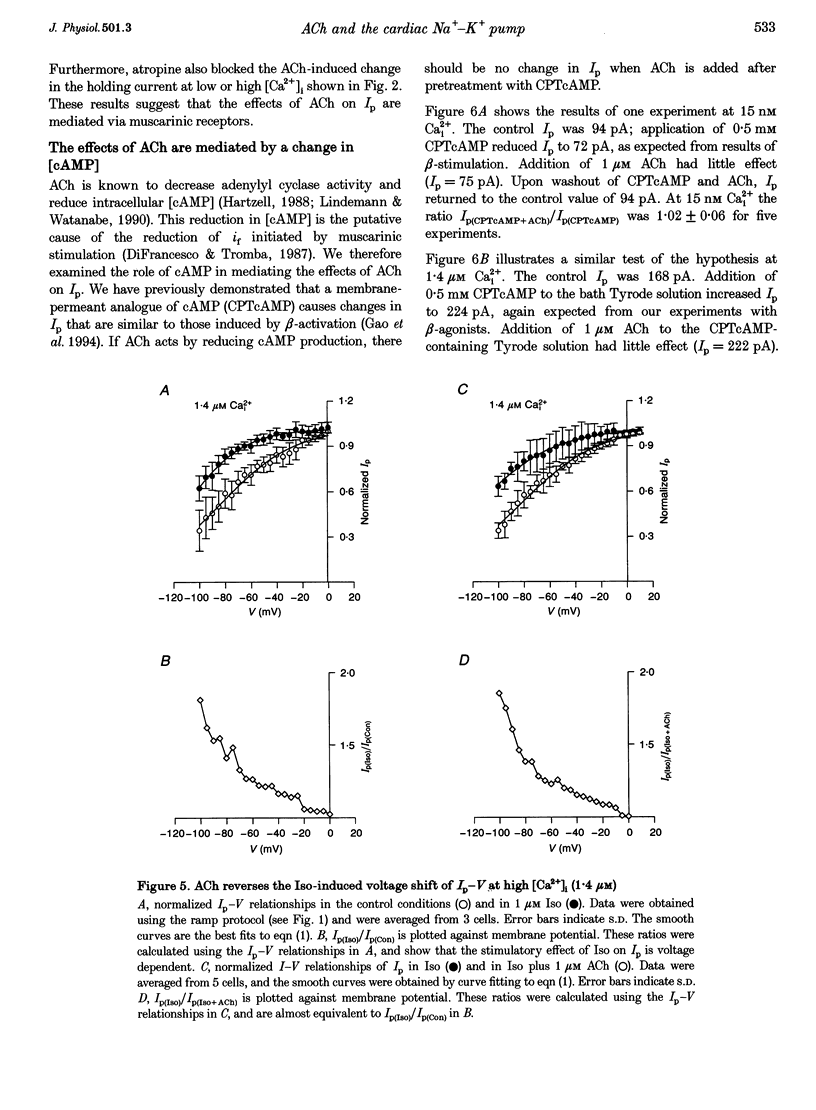
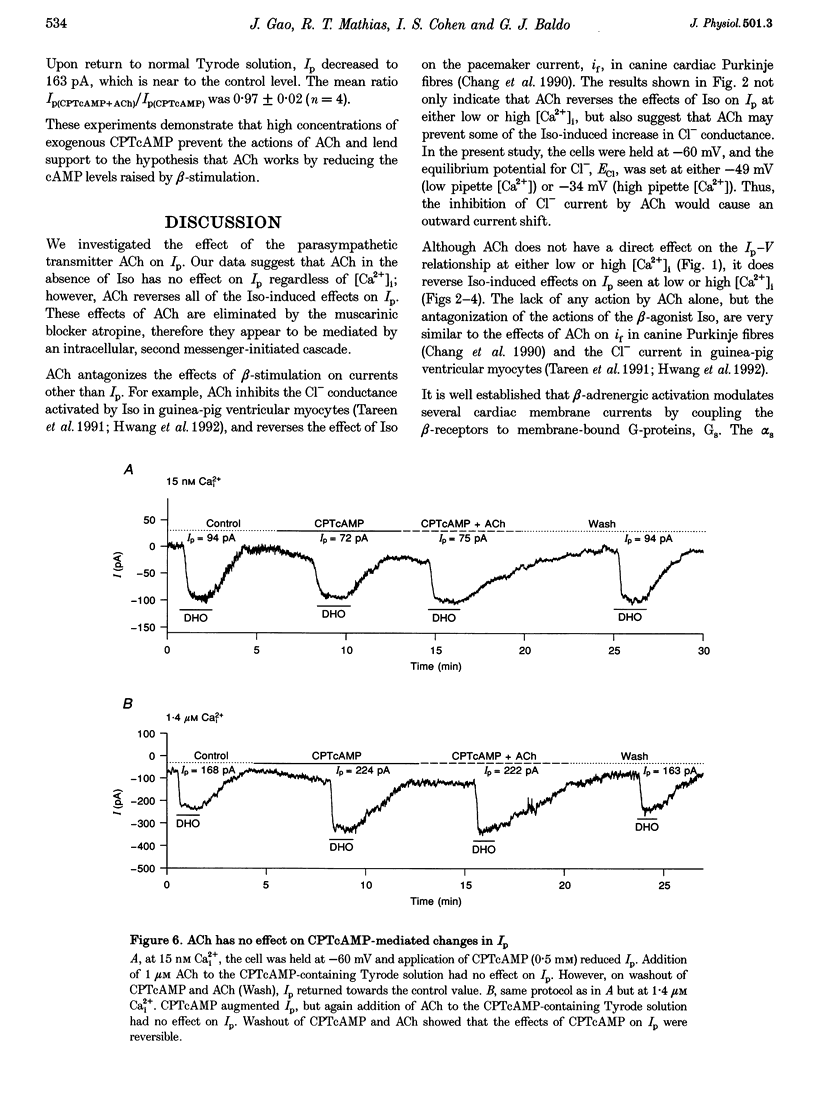
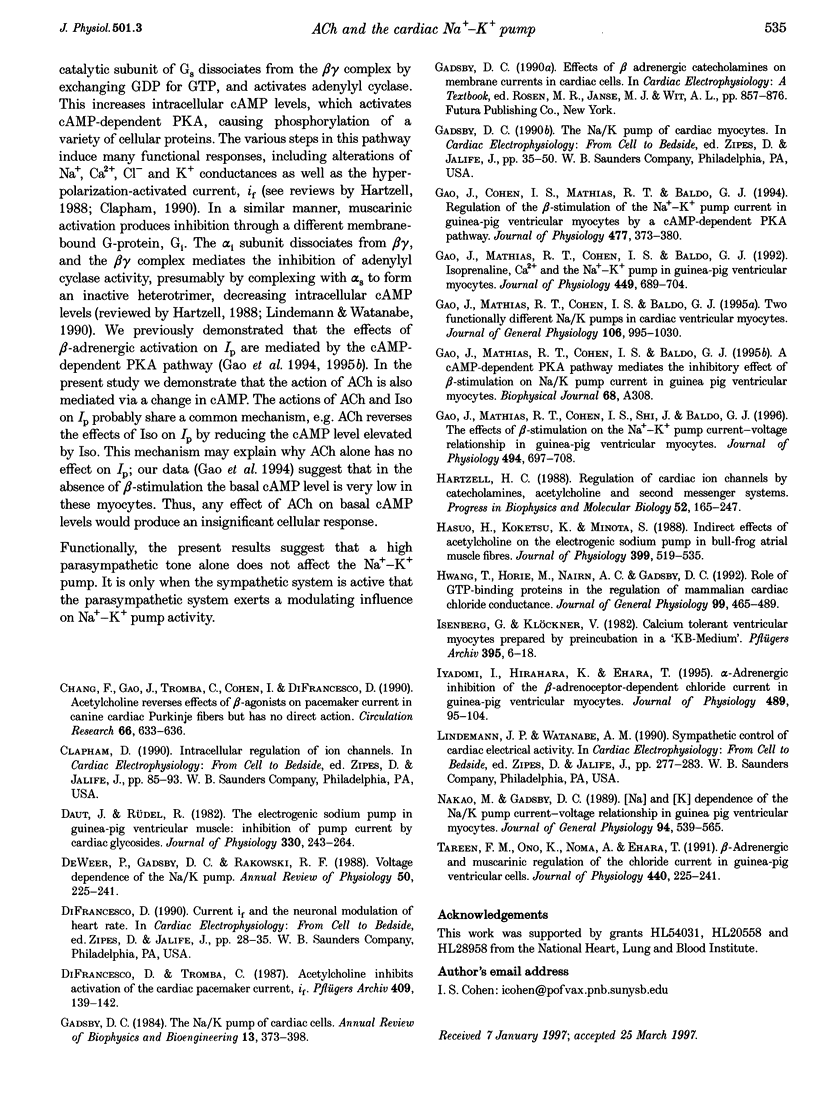
Selected References
These references are in PubMed. This may not be the complete list of references from this article.
- Chang F., Gao J., Tromba C., Cohen I., DiFrancesco D. Acetylcholine reverses effects of beta-agonists on pacemaker current in canine cardiac Purkinje fibers but has no direct action. A difference between primary and secondary pacemakers. Circ Res. 1990 Mar;66(3):633–636. doi: 10.1161/01.res.66.3.633. [DOI] [PubMed] [Google Scholar]
- Daut J., Rüdel R. The electrogenic sodium pump in guinea-pig ventricular muscle: inhibition of pump current by cardiac glycosides. J Physiol. 1982 Sep;330:243–264. doi: 10.1113/jphysiol.1982.sp014339. [DOI] [PMC free article] [PubMed] [Google Scholar]
- De Weer P., Gadsby D. C., Rakowski R. F. Voltage dependence of the Na-K pump. Annu Rev Physiol. 1988;50:225–241. doi: 10.1146/annurev.ph.50.030188.001301. [DOI] [PubMed] [Google Scholar]
- DiFrancesco D., Tromba C. Acetylcholine inhibits activation of the cardiac hyperpolarizing-activated current, if. Pflugers Arch. 1987 Sep;410(1-2):139–142. doi: 10.1007/BF00581906. [DOI] [PubMed] [Google Scholar]
- Gadsby D. C. The Na/K pump of cardiac cells. Annu Rev Biophys Bioeng. 1984;13:373–398. doi: 10.1146/annurev.bb.13.060184.002105. [DOI] [PubMed] [Google Scholar]
- Gao J., Cohen I. S., Mathias R. T., Baldo G. J. Regulation of the beta-stimulation of the Na(+)-K+ pump current in guinea-pig ventricular myocytes by a cAMP-dependent PKA pathway. J Physiol. 1994 Jun 15;477(Pt 3):373–380. doi: 10.1113/jphysiol.1994.sp020199. [DOI] [PMC free article] [PubMed] [Google Scholar]
- Gao J., Mathias R. T., Cohen I. S., Baldo G. J. Isoprenaline, Ca2+ and the Na(+)-K+ pump in guinea-pig ventricular myocytes. J Physiol. 1992 Apr;449:689–704. doi: 10.1113/jphysiol.1992.sp019109. [DOI] [PMC free article] [PubMed] [Google Scholar]
- Gao J., Mathias R. T., Cohen I. S., Baldo G. J. Two functionally different Na/K pumps in cardiac ventricular myocytes. J Gen Physiol. 1995 Nov;106(5):995–1030. doi: 10.1085/jgp.106.5.995. [DOI] [PMC free article] [PubMed] [Google Scholar]
- Gao J., Mathias R. T., Cohen I. S., Shi J., Baldo G. J. The effects of beta-stimulation on the Na(+)-K+ pump current-voltage relationship in guinea-pig ventricular myocytes. J Physiol. 1996 Aug 1;494(Pt 3):697–708. doi: 10.1113/jphysiol.1996.sp021525. [DOI] [PMC free article] [PubMed] [Google Scholar]
- Hartzell H. C. Regulation of cardiac ion channels by catecholamines, acetylcholine and second messenger systems. Prog Biophys Mol Biol. 1988;52(3):165–247. doi: 10.1016/0079-6107(88)90014-4. [DOI] [PubMed] [Google Scholar]
- Hasuo H., Koketsu K., Minota S. Indirect effects of acetylcholine on the electrogenic sodium pump in bull-frog atrial muscle fibres. J Physiol. 1988 May;399:519–535. doi: 10.1113/jphysiol.1988.sp017094. [DOI] [PMC free article] [PubMed] [Google Scholar]
- Hwang T. C., Horie M., Nairn A. C., Gadsby D. C. Role of GTP-binding proteins in the regulation of mammalian cardiac chloride conductance. J Gen Physiol. 1992 Apr;99(4):465–489. doi: 10.1085/jgp.99.4.465. [DOI] [PMC free article] [PubMed] [Google Scholar]
- Isenberg G., Klockner U. Calcium tolerant ventricular myocytes prepared by preincubation in a "KB medium". Pflugers Arch. 1982 Oct;395(1):6–18. doi: 10.1007/BF00584963. [DOI] [PubMed] [Google Scholar]
- Iyadomi I., Hirahara K., Ehara T. alpha-Adrenergic inhibition of the beta-adrenoceptor-dependent chloride current in guinea-pig ventricular myocytes. J Physiol. 1995 Nov 15;489(Pt 1):95–104. doi: 10.1113/jphysiol.1995.sp021033. [DOI] [PMC free article] [PubMed] [Google Scholar]
- Nakao M., Gadsby D. C. [Na] and [K] dependence of the Na/K pump current-voltage relationship in guinea pig ventricular myocytes. J Gen Physiol. 1989 Sep;94(3):539–565. doi: 10.1085/jgp.94.3.539. [DOI] [PMC free article] [PubMed] [Google Scholar]
- Tareen F. M., Ono K., Noma A., Ehara T. Beta-adrenergic and muscarinic regulation of the chloride current in guinea-pig ventricular cells. J Physiol. 1991;440:225–241. doi: 10.1113/jphysiol.1991.sp018705. [DOI] [PMC free article] [PubMed] [Google Scholar]


